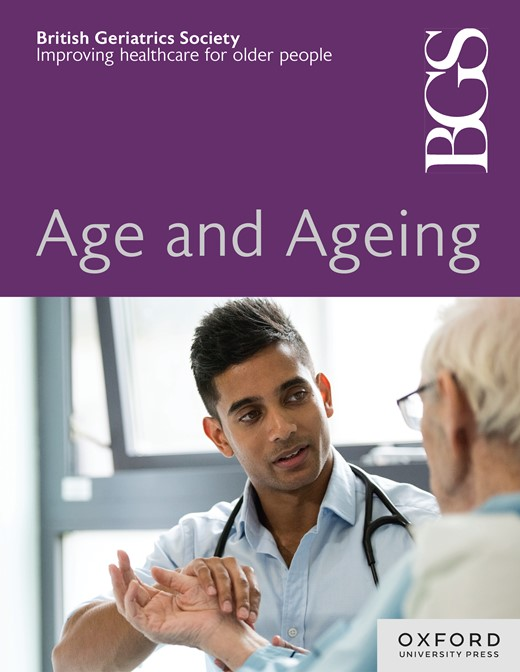The effects of in-hospital orthogeriatric care on health-related quality of life: a systematic review and meta-analysis
IF 6
2区 医学
Q1 GERIATRICS & GERONTOLOGY
引用次数: 0
Abstract
Background Orthogeriatric care has been shown to effectively reduce mortality and morbidity and has a potential impact on health-related quality of life (HRQoL). This systematic review and meta-analysis summarises the effects of orthogeriatric care on HRQoL in hip fracture patients. Methods The review protocol was registered in International Prospective Register of Systematic Reviews (PROSPERO): CRD42021206280. We searched Medline and EMBASE from inception to January 2024 without language restrictions. We included randomised and non-randomised controlled trials comparing HRQoL in older hip fracture patients receiving orthogeriatric care to other fracture care. Study quality was evaluated using the Revised Cochrane Risk-of-Bias (RoB) tool or the Newcastle–Ottawa Scale (NOS). Pooled standardised mean differences (SMDs) were calculated using random-effects models. We reported according to the Preferred Reporting Items of Systematic reviews and Meta-Analyses guidelines. Results Eight studies involving 2411 patients were included, all employing various orthogeriatric care models with moderate to good methodological quality, based on the RoB tool and NOS. However, substantial clinical heterogeneity was present due to variations in study design, number and execution of intervention components, outcome measures and patient populations. Despite this variability, meta-analysis showed that in-hospital orthogeriatric care, compared to usual care, led to a small but statistically significant improvement in overall HRQoL (SMD 0.18, 95% CI 0.06–0.30) with moderate heterogeneity (I2 = 47%). Conclusion In-hospital orthogeriatric care has a small but significant effect on HRQoL. This study highlights the need for clear descriptions of orthogeriatric care models, their implementation, fidelity and contextual factors. High-quality future research is essential to advance clinical practice, refine care models, address methodological limitations and prioritise patient-centred short- and long-term HRQoL outcomes.住院骨科护理对健康相关生活质量的影响:系统回顾和荟萃分析
背景:骨科护理已被证明能有效降低死亡率和发病率,并对健康相关生活质量(HRQoL)有潜在影响。本系统综述和荟萃分析总结了骨科护理对髋部骨折患者HRQoL的影响。方法本综述方案在国际前瞻性系统评价注册(PROSPERO)中注册:CRD42021206280。我们检索了Medline和EMBASE,从创立到2024年1月,没有语言限制。我们纳入了随机和非随机对照试验,比较老年髋部骨折患者接受骨科治疗与其他骨折治疗的HRQoL。采用修订Cochrane风险偏倚(RoB)工具或纽卡斯尔-渥太华量表(NOS)评估研究质量。采用随机效应模型计算合并标准化平均差(SMDs)。我们根据系统评价和荟萃分析指南的首选报告项目进行报告。结果纳入8项研究,涉及2411例患者,均采用各种方法质量中等至良好的骨科护理模式,基于RoB工具和NOS。然而,由于研究设计、干预成分的数量和执行、结果测量和患者群体的差异,存在大量的临床异质性。尽管存在这种可变性,但荟萃分析显示,与常规护理相比,住院骨科护理可导致总体HRQoL的微小但具有统计学意义的改善(SMD为0.18,95% CI为0.06-0.30),具有中等异质性(I2 = 47%)。结论住院骨科护理对患者HRQoL的影响虽小,但效果显著。本研究强调需要明确描述骨科护理模式,其实施,保真度和背景因素。高质量的未来研究对于推进临床实践、完善护理模式、解决方法局限性和优先考虑以患者为中心的短期和长期HRQoL结果至关重要。
本文章由计算机程序翻译,如有差异,请以英文原文为准。
求助全文
约1分钟内获得全文
求助全文
来源期刊

Age and ageing
医学-老年医学
CiteScore
9.20
自引率
6.00%
发文量
796
审稿时长
4-8 weeks
期刊介绍:
Age and Ageing is an international journal publishing refereed original articles and commissioned reviews on geriatric medicine and gerontology. Its range includes research on ageing and clinical, epidemiological, and psychological aspects of later life.
 求助内容:
求助内容: 应助结果提醒方式:
应助结果提醒方式:


